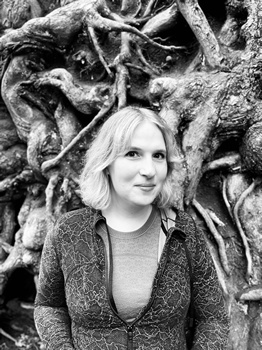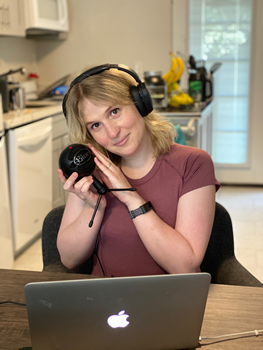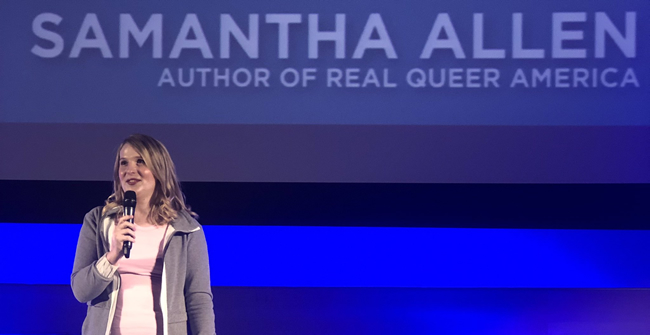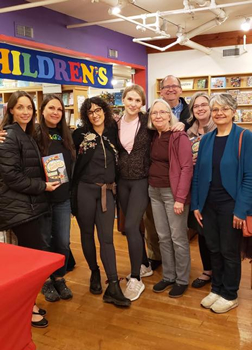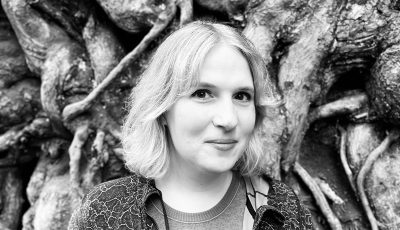

Up Close: Samantha Allen
Reality Bites
In Samantha Allen’s shapeshifting horror debut, the cast and crew of a Bachelor-style reality show sequester themselves on a remote island in the Pacific Northwest. There’s no point being coy about what’s waiting for them in the woods: When the production heads out to the island’s shadowy forests for a “glamping” event, they run afoul of a female Bigfoot, and the carnage begins.
By the time The Catch takes its production to Otters Island, Washington, the bulk of the cast has already been sent home via the show’s weekly elimination trial. Only four women are left to compete for the attention of “the Catch,” a slimy social media app entrepreneur named Jeremy Blackstone: a Christian influencer, a fashion vlogger, a car show model, and, somehow, Renee, an HR rep who, as she’s told early in the book, has no chance of “winning” but is being kept on the show to become its first Black finalist. Renee is fine with not being chosen to marry Jeremy, partly because he’s a walking Axe body spray commercial and partly because she’s beginning to think she might be more attracted to women than men.
The island is an unlikely destination for the show—it used to be a popular LGBTQ+ vacation destination, but the unsolved disappearance of a trio of female hikers scared the tourists away, and the production team mostly has the island to themselves. But Renee isn’t the only lonely, unfulfilled woman on Otters Island: There’s also Patricia, a moody, curious, and preternaturally strong Otters Islander who also happens to be a Sasquatch. Patricia is mostly content to hang out in the woods and do mundane Sasquatch things, but she’s not above dismembering the occasional visitor to break up the monotony.
Allen, a GLAAD Award-winning journalist and author of the terrific 2019 travelogue Real Queer America: LGBT Stories from Red States, smoothly navigates the novel’s jumps from breezy chick-lit to sharp-fanged satire to gory, no-holds-barred horror. Like the architects of most great monster stories, Allen keeps her creature offstage for as long as possible, giving the characters (and readers) only occasional, chilling glimpses of what’s waiting for them. But even before Patricia gets down to business, the book is fast-paced, funny, and thoughtful. Whether you’re here for reality-show backbiting, nuanced social commentary, or flesh-ripping monster action, you’ll be richly rewarded.
In her first-ever interview with The Big Thrill, Allen talks about the similarities between slasher movies and reality shows, why “a lady Sasquatch” was the perfect choice for her book, and her undying love for Friday the 13th Part VIII: Jason Takes Manhattan.
PATRICIA WANTS TO CUDDLE is a lot of things, and they’re all wonderful. It’s a little bit chick-lit, a lot of social satire, a takedown of reality TV (but also kind of a fan letter?), and gruesome, gory horror, with a decades-old mystery and a sweet, sad love story playing out in a variety of formats during the parts when no one’s scheming to stay on the show or getting ripped in half. How different is the finished product from the book you initially set out to write?
In very early stages, PATRICIA was more satire than anything else. But after I got a few thousand words down, that strict focus no longer felt true to who I was as a writer. I don’t really like staying in a single lane; life itself is no respecter of genre, and my favorite fiction isn’t either. The stories that stick with me the longest aim to capture the inherent chaos of being alive, in all its glory and brutality, while still overlaying enough narrative structure to remain propulsive. I wanted to create something in the same vein.
If I were wired differently, I think it would have been possible to be very mercenary about PATRICIA. I could have kept going with the original direction and just written a straightforward teardown of popular reality dating programs with a dash of horror sprinkled on top but none of those other elements added to the mix. But then I started inserting love letters and fan forum posts between chapters and searching for the souls of my intentionally stereotypical characters, and the book evolved into a strange, beautifully messy beast.
I remember fretting to my agent about whether I was making it un-sellable by shifting direction, and she told me, “I’m not sure you know how to write any other way.” I chose to take that as a compliment. I’ve got a weird, broken brain that can’t fold a pair of pants correctly but that can bridge dismemberment scenes together with Sapphic epistles. Ultimately, it was better to embrace my own tendencies than to hew closer to convention.
You wrote a terrific essay for LitHub about the correlations between elimination-format reality shows and slasher movies. What triggered that realization, and how did it turn into PATRICIA WANTS TO CUDDLE?
There are two things my wife and I have always watched together: The Bachelor and horror movies. Honestly, I’m surprised it took me as long as it did to decide to blend them together. Both have the exact same elimination-style structure: people are “eliminated,” one after the next, until there’s a single “survivor.” It seemed like such a natural marriage that we even toyed with the idea of writing it as a screenplay five years ago, with more of a playful Scream vibe to the proceedings. That idea went on the back burner for a long time. I thought it was fun, but to turn something into a book, you need to be willing to give yourself to it for a few years, and I didn’t want to do that unless I had a deeper hook. Then, once I came to understand that reality TV wasn’t just fluffy entertainment but also a window into our collective consciousness, the idea felt new again and took on an added urgency. I started writing and didn’t stop.
PATRICIA’s main character is Renee, a bisexual Black woman who stands to be The Catch’s first Black finalist. Unless I’m wrong, it took The Bachelor 25 seasons to cast a Black lead, and the show is almost acrobatically heteronormative. Other reality show genres are far more inclusive—why do you think dating shows have been slow to catch up?
Romance and attraction feel incredibly personal, and so I think there’s a resistance to seeing them as socially contingent. People have “types.” They have “preferences.” Dating apps have “filters.” And reality dating shows have casting producers. All of these are ways of sorting possible partners into wanted and unwanted piles. But unless you were raised in a hermetically sealed bunker with no access to media, you grew up absorbing messages about the desirability of various social groups. Those messages were in movies, TV shows, books, commercials—so abundant and pervasive that they were barely noticeable unless you were being maligned, and even then, you might have internalized that prejudice.
That’s how we end up with a lot of white people who will only seriously consider other white people as prospective partners, and who are convinced that this exclusion has nothing at all to do with racism. Of course, that’s not true. And yet suggesting otherwise is often met with defensiveness or an appeal to the idiosyncrasies of the heart.
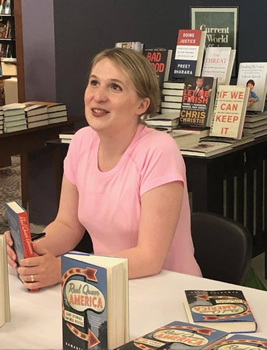
Allen signs copies of her 2019 memoir-travelogue Real Queer America: LGBT Stories from Red States in Atlanta.
The Bachelor has indeed been embarrassingly slow to cast Black leads, showcase Black contestants, and produce more diverse casts. Contestants of color experience microaggressions while filming the show itself and receive a torrent of racist abuse on social media when it airs. It’s shameful. Speaking frankly, I suspect many Bachelor leads would never envision themselves being with a non-white person in the long-term, which is why there’s a predictable point of the season at which Black contestants start to get sent home: not too soon, lest the lead appear racist, but before the point at which the couple would meet each other’s parents. And yet when non-white fans try to call this pattern out, they’re met with accusations that they’re trying to control someone’s attraction.
I don’t think other reality shows are immune from racism—Drea Wheeler and Maryanne Oketch recently spoke about the experiences of Black contestants on Survivor during a moving Tribal Council—but I do agree that casts are getting more inclusive. I just wish Americans were as comfortable watching people of color fall in love on TV as they are turning them into reaction GIFs.
Did you think of Renee as a final girl while you were writing?
Absolutely. In fact, at one point I had some very on-the-nose reference to the final girl trope that was edited out and thank God for that, because it was too cute by half. Renee’s a classic example of a final girl, someone irrevocably changed by a single night of horror. That said, people will have to read the book to find out whether I kept a few characters alive or left Renee as the sole survivor. I don’t want to give too much away.
Why Bigfoot?
Why not Bigfoot? But seriously, having a Sasquatch lurking in the woods was the key that unlocked PATRICIA. A lady Sasquatch doesn’t just make a great horror monster, she’s also a symbol of everything a conventionally attractive reality TV show contestant might be afraid of becoming: a big, hairy Other. She performs a dual role of being both a very real physical threat but also as a figurative threat to a certain brand of heteronormative hyperfemininity.
What did you enjoy most about writing the book, and what gave you the biggest headache?
I loved writing the kills. Creating a character only to murder them is maybe the closest to playing God that an author can get. The biggest headache? At some point in most horror stories, you do have to split your characters up. It’s virtually impossible to write the scene believably, but it’s often indispensable. I went through multiple drafts and configurations of how people parted ways with the help of my very patient editor.
A novel is such a major undertaking; there’s the writing of it, of course, then you’re spending months and months revising, polishing, submitting, and then promoting it. How did you know this was the book you wanted to spend the next couple of years on?
I think every book I’ve written has felt like pouring all of myself onto the page. Real Queer America was my optimism, my curiosity, my determination. PATRICIA is my fear, my insecurity, my loneliness, and, yes, my love. I knew I could spend years on this novel because it felt like I was just directly translating my heart into words.
The downside is that I often feel like there’s nothing left of me when I finish a book—like I’m a tabula rasa once again ready to absorb new experiences until the next concept overtakes me. So basically, right now, being between books, I’m not really sure who I am. That’s always a bit disconcerting! But before long, I’ll start putting words down again and, in the process, find out how I’ve changed in the last couple years.
Though PATRICIA is technically a monster story, it incorporates many of the classic elements we’d expect from a slasher movie. Were there any particular genre tropes that you were careful to avoid?
To be honest, some slasher movie tropes are too fun not to use. My horror tastes ran the gamut from high- to lowbrow, so I can get down with a good paint-by-numbers killfest. Jason Takes Manhattan is one of my favorite movies to rewatch, and it’s absolutely riddled with clichés. With PATRICIA, I wanted the plot to be packaged inside a slasher container, but I tried to subvert who you might expect to die when and to defy a few other traditions of the form. I also tried to deepen the characters further as they approached their deaths, starting them out as these boilerplate stock templates but ultimately developing them into surprisingly sympathetic figures.
The result is a book that I hope you can enjoy with your brain switched on or off, depending on your preference. I wanted it to work as both a fun Friday the 13th-style popcorn flick and as a heartfelt rumination on the loneliness of the social media era if you’re interested in connecting with the book on a thematic level. I truly have no judgments either way. I’m just flattered if someone reads it!
How did your experiences while researching and writing Real Queer America influence PATRICIA WANTS TO CUDDLE?
Two of my characters are from Arkansas, a state I visited for the first time while writing Real Queer America and again while on tour with that book. I fell in love with the beauty of the Ozarks and with the rich and complicated history of Little Rock. Those trips informed how I wrote the love letters in the third act.
But I think there was a more emotional takeaway from Real Queer America that ended up in PATRICIA, and that’s how much more satisfying it was to connect with other LGBTQ+ people face to face than it was to just talk to each other online. The road trip I took for RQA was the greatest adventure of my life. There’s no substitute for spending two months traveling the country rubbing shoulders with fellow queer folks. After I came home from that experience in 2017, and then again from my book tour in 2019, I felt deeply isolated. My social interactions shrank from encompassing an entire country to fitting on a five-inch screen. A lot of that alienation went into PATRICIA, which is in many ways a fantasy about a world where the physical still precedes the digital.
Is there more fiction in your future? Can you tell us anything at all about what you’re working on now?
If people buy and read PATRICIA, I’ll definitely write more fiction! Clamor for more and you shall receive. Which is my way of masking how anxious I actually feel about this debut. I can’t say much, but I am tinkering with an idea for a romantic thriller. Stay tuned.
- Between the Lines: Rita Mae Brown - March 31, 2023
- Between the Lines: Stephen Graham Jones - January 31, 2023
- Between the Lines: Grady Hendrix - December 30, 2022


